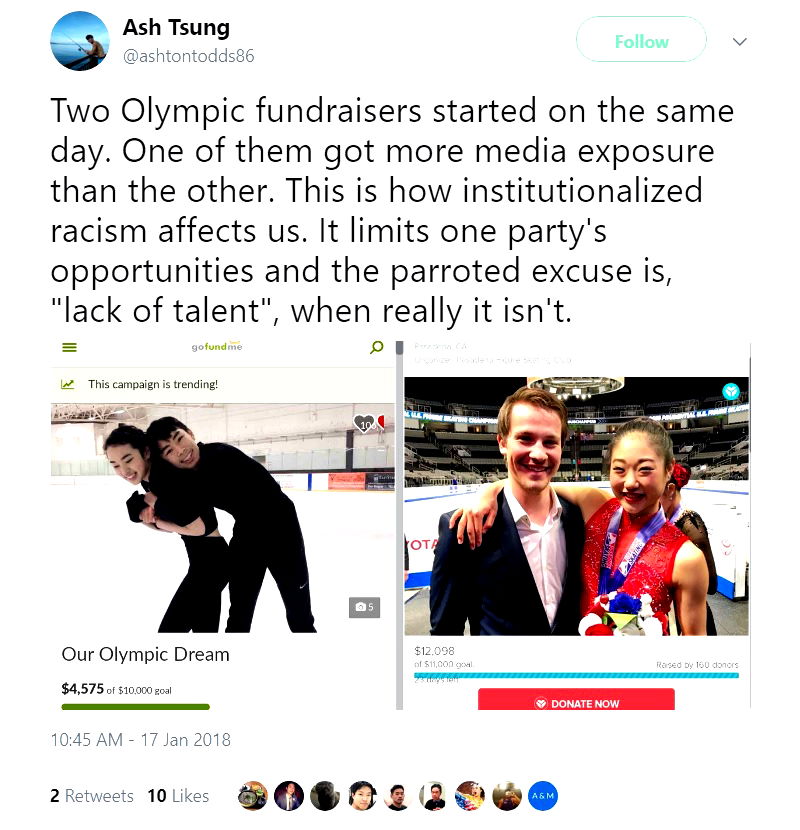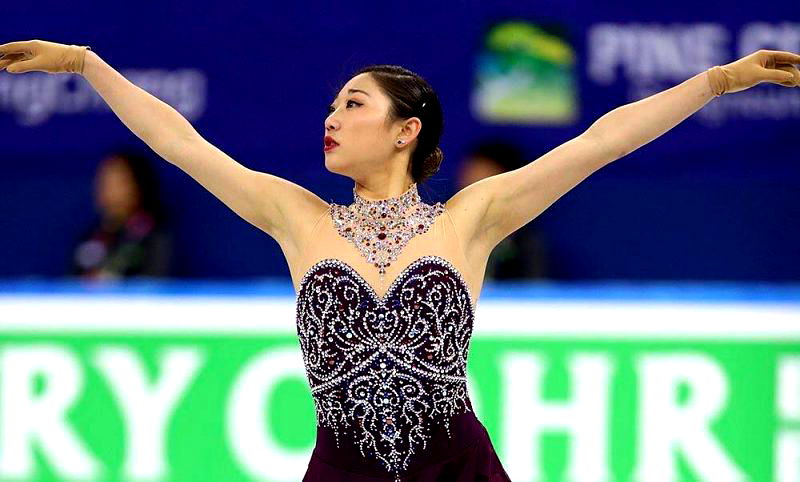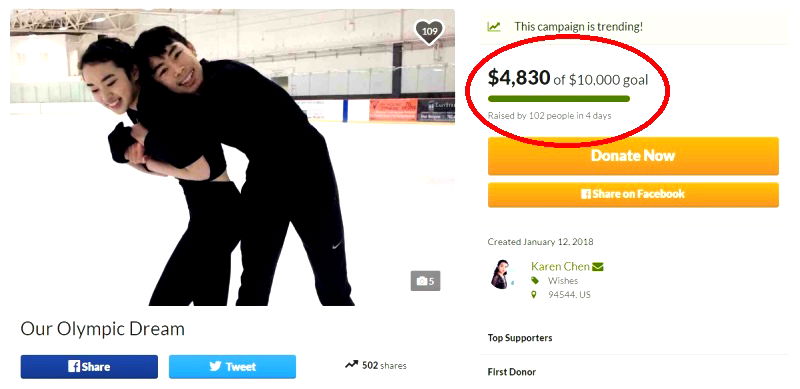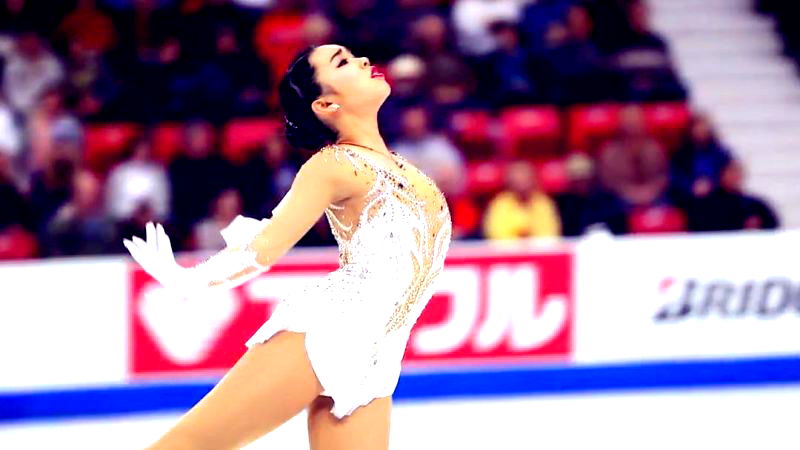Olympic Figure Skaters Start Fundraising on the Same Day, But Get Very Different Results



By Carl Samson
Many are thrilled that figure skaters Mirai Nagasu and Karen Chen are representing Team USA in the upcoming Winter Olympics in Pyeongchang next month.
What grabbed people’s attention, however, is the fact that while both started their individual fundraising on January 12, one quickly achieved her goal.
Some were curious to find out why until they stumbled upon this tweet:

According to Twitter user Ash Tsung, it’s “institutionalized racism.” But what is it about, exactly?
For the uninitiated, you’ll find countless definitions if you Google the term now. But an apparent consensus is this: institutional racism is a form of racial discrimination perpetrated in practice by social institutions such as the government, courts, banks, schools and the media. It affects everyone at the same time, albeit in varying ways.

In this case, it may influence a way of thinking that is more favorable to one group than another — a way of thinking that favors White people (or relationships with them) over Asians (particularly Asian men) or Asian couples.
We wouldn’t imply that’s the case, but some may think it nonetheless, so here is why that would be.
It should be said there’s nothing wrong with Nagasu meeting her fund target in just a few days. As fellow Asians who recognize her (and Chen’s) superb talent, we can only be glad! Her donations come from people who truly admire her skills and support her.

But through a racial lens, one may eventually wonder: How many might support her solely based on the fact that she is posing in the picture with a White man, perhaps with the added implication that the individual is of a personal relation to her. Perhaps it wasn’t the case here, and the difference in funds raised has nothing to do with what the picture may be implying.
But is it even a possibility?
We know there exists values among some in Asian communities around the world that symbolically glorify relationships with White people, both men and women. We know there are certain groups, some that might associate themselves with more conservative movements, that glorify relationships specifically with White men and Asian women, perhaps sometimes in objectifying, dehumanizing, and fetishistic manners. We also know there exists values in both these types of groups where mostly Asian men, but sometimes even White women, are thrown in less-than-favorable lights or branded with very damaging stereotypes.
Not everyone adopts these values, and not everything should be viewed in just these lights, yet many may perhaps be quick to accuse others of these tendencies or be accused of them.
Many might call it “White worship”, and evidence of its cultural influence can be found in nearly all forms of media going back to the birth of cinema to even today. It’s a product of the institutionalized racism that affects people of color all around the world.

In this case, it would hypothetically favor Mirai Nagasu’s campaign for her association to the White man in her featured image over Karen Chen’s campaign who used a photo with her brother as a featured image. Some might argue that this is because Asian men, and merely the appearance of an Asian couple, are thought inferior when compared to a couple where one partner, man or woman, happens to be White. Naturally, institutionalized racism would cause the majority to lean in support of Nagasu’s campaign. Meanwhile, Chen’s campaign may not be shared or publicized as much, perhaps even going so far as to be purposefully ignored by some.
It is neither Olympic skater’s fault that this cultural mindset exists. It would be wrong to assume Nagasu is intentionally perpetuating what some consider damaging stereotypes or make assumptions on the kind of people donating to her.
But perhaps none of this is the case, and society is better and more well-intentioned than we might assume. We shouldn’t develop a mentality of looking for evidence to reinforce stereotypes we may wish to criticize while ignoring reality.
Both figure skaters are looking to get their supportive family and friends to the Olympics. Nagasu’s campaign was organized by the Pasadena Figure Skating Club (of which she’s a member) and included Nagasu’s background to would-be supporters.
Chen, by comparison, launched her own campaign and wrote a lengthy and heartfelt note to her supporters. To quote some of her words:
“I made the Olympic team. It’s everything I’ve ever wanted. It’s everything I’ve ever dreamed of. It’s truly one of the main reasons why I work so hard every day. I want to be able to experience like lifelong goal experience with my family; but there’s a tiny issue, financially getting them all there, especially my parents and my brother is extremely difficult.”

“I’m hoping that the money raised here can help my with my training and get my family to PyeongChang with me to support me as much as they can. I’m really hoping that my brother will be able to come with me and share this experience with me as well as many of my close family members from Taiwan.
“Your donation regardless the size would truly mean the world to us. We are eternally grateful.”

Whether or not their campaign performance’s indicate a toxic culture at play, both world-class female athletes should be treated with respect and celebrated for their accomplishments, not demonized by stereotyped assumptions.
You can support Chen and Nagasu’s campaigns here and here, respectively. They will be joined by Bradie Tennell — who’s also amazing — to represent the U.S. team at the Olympics.
We hope Chen meets her target soon, too. Good luck!
Share this Article
Share this Article